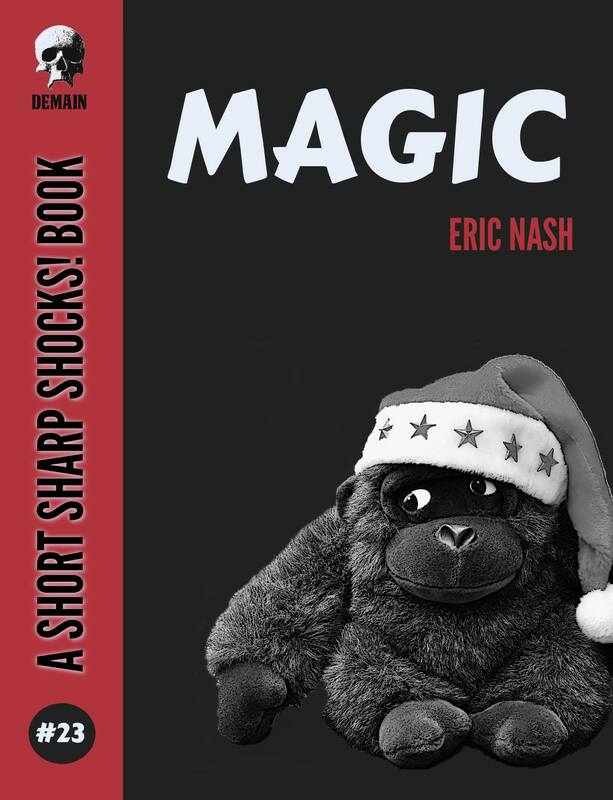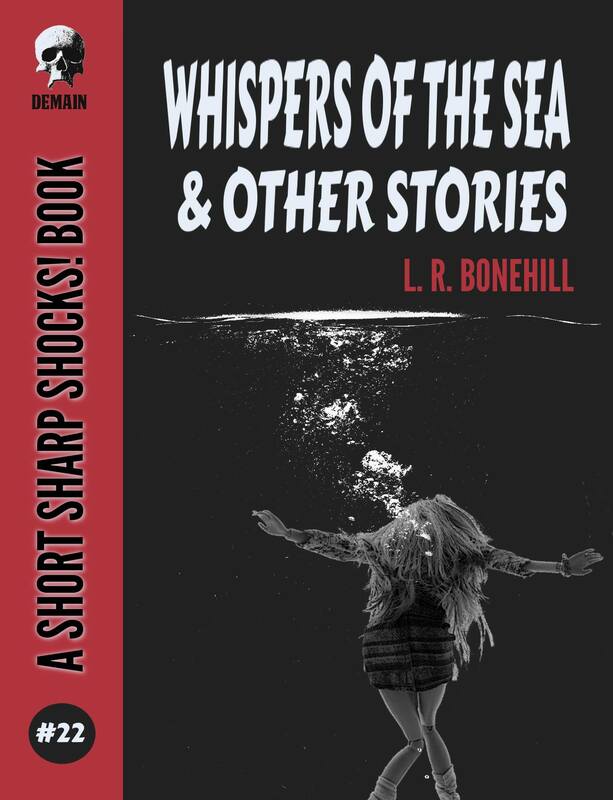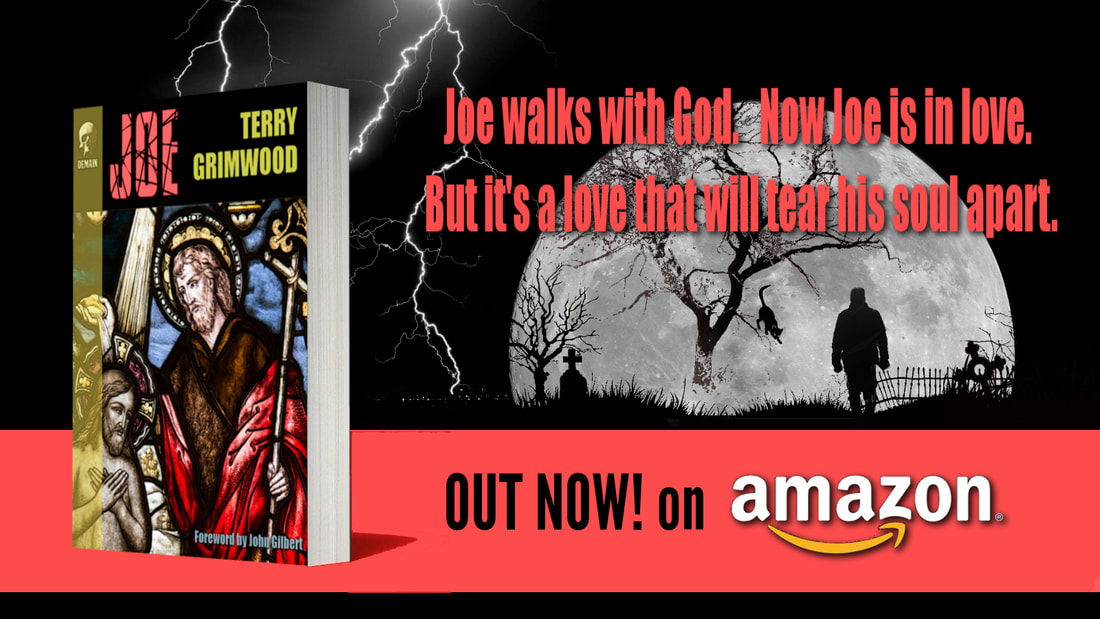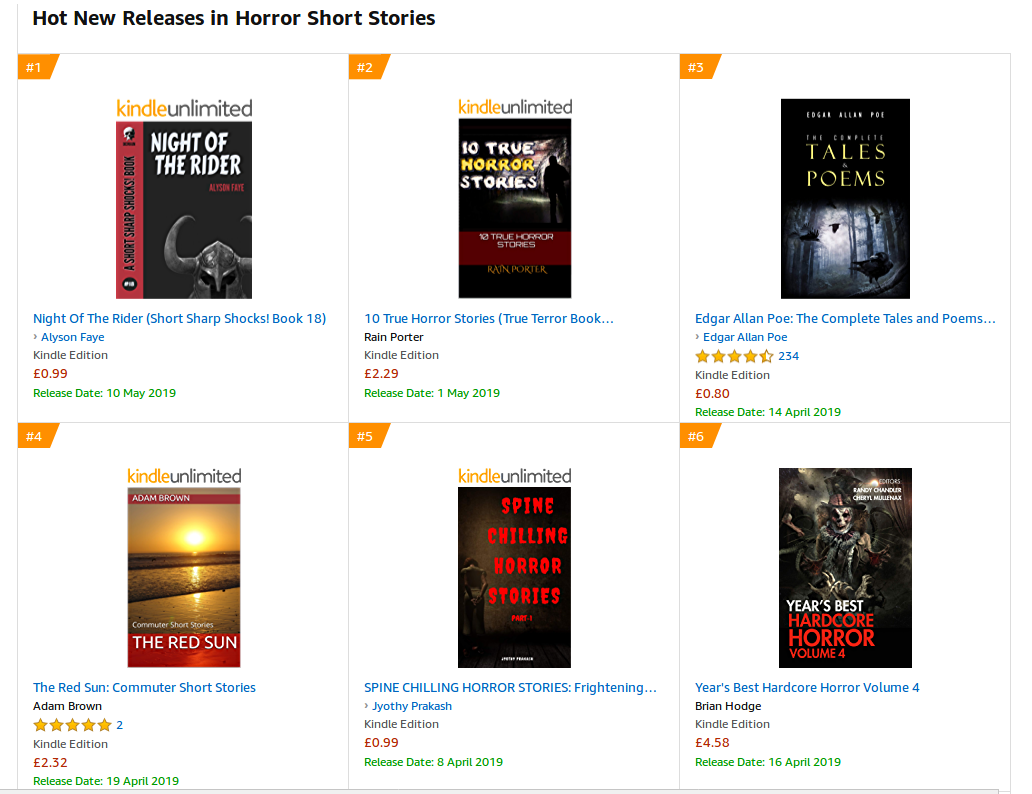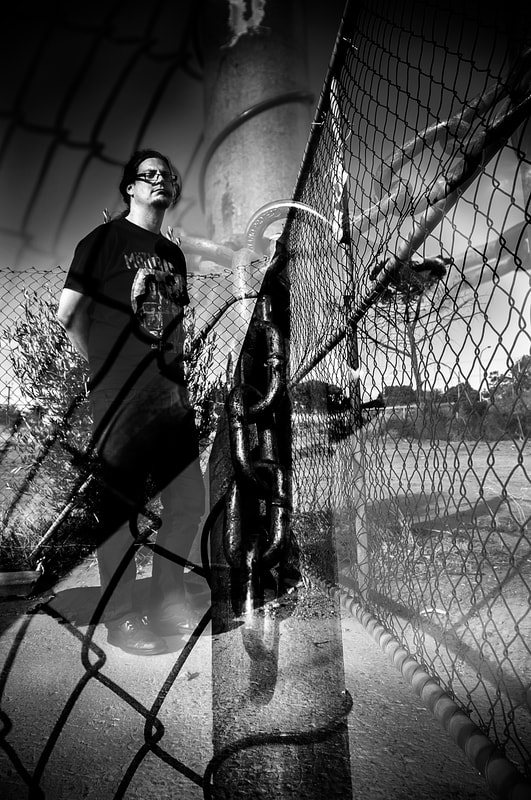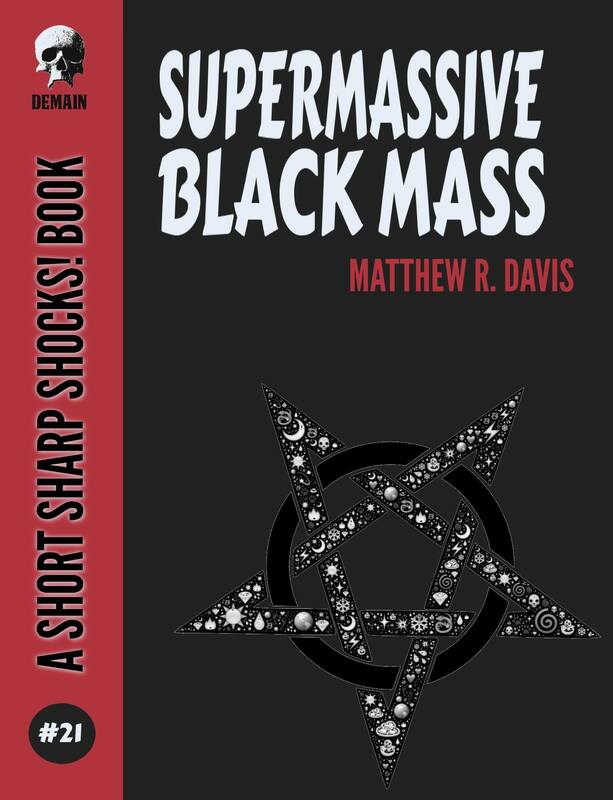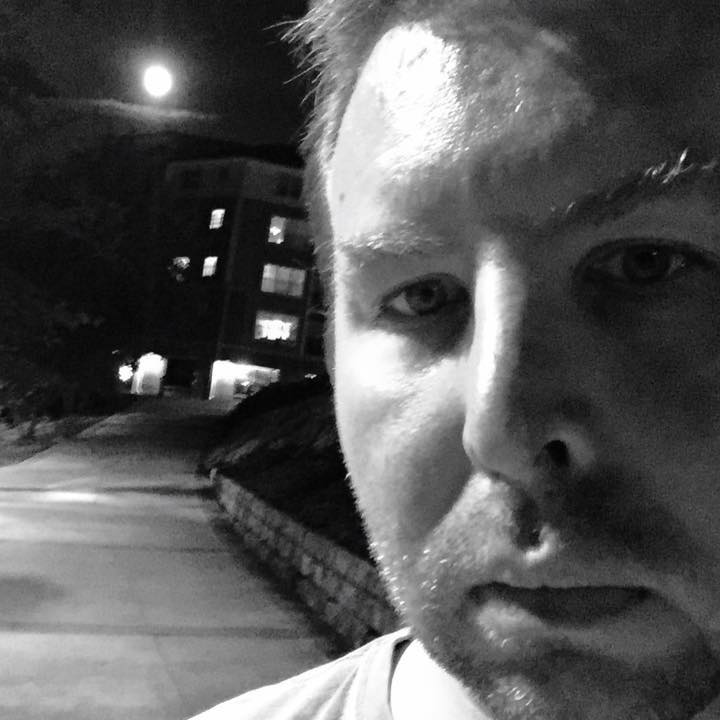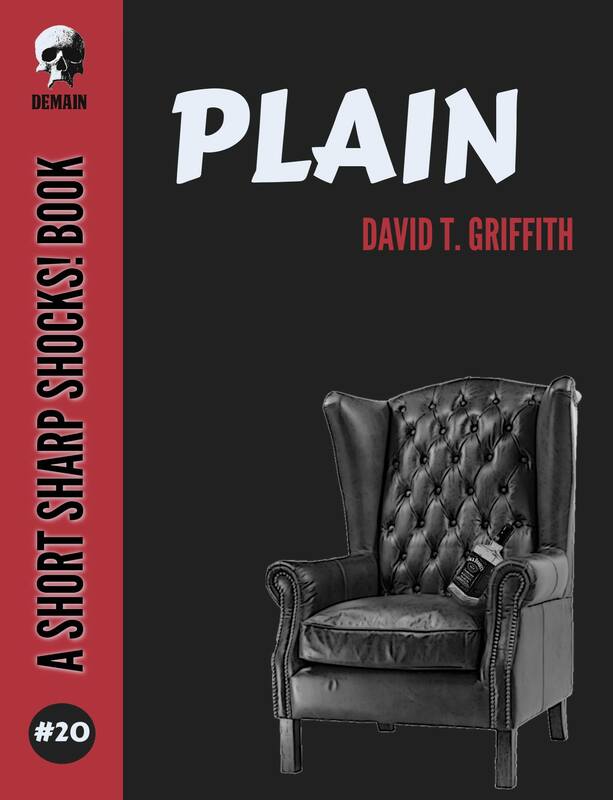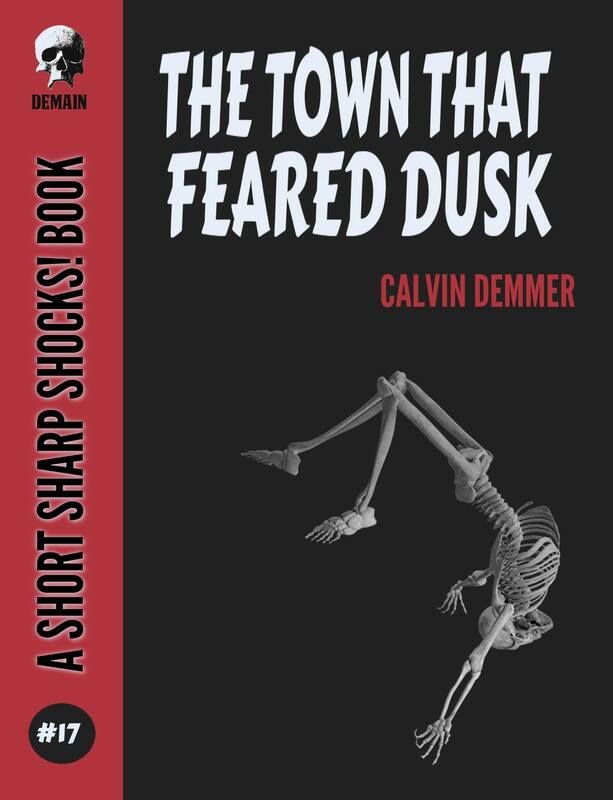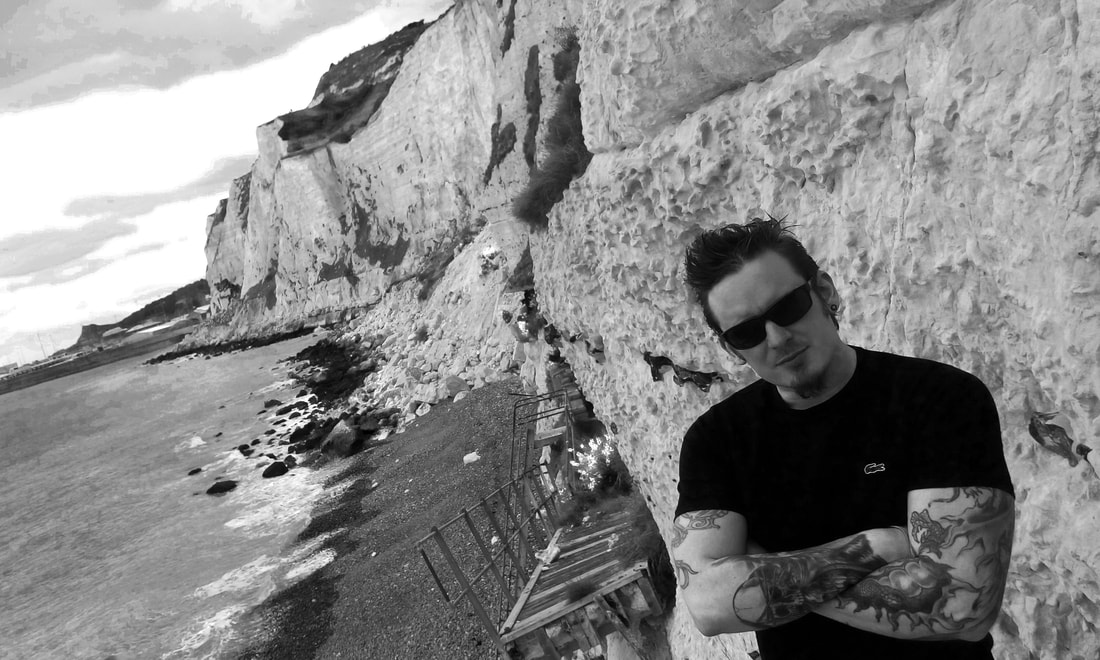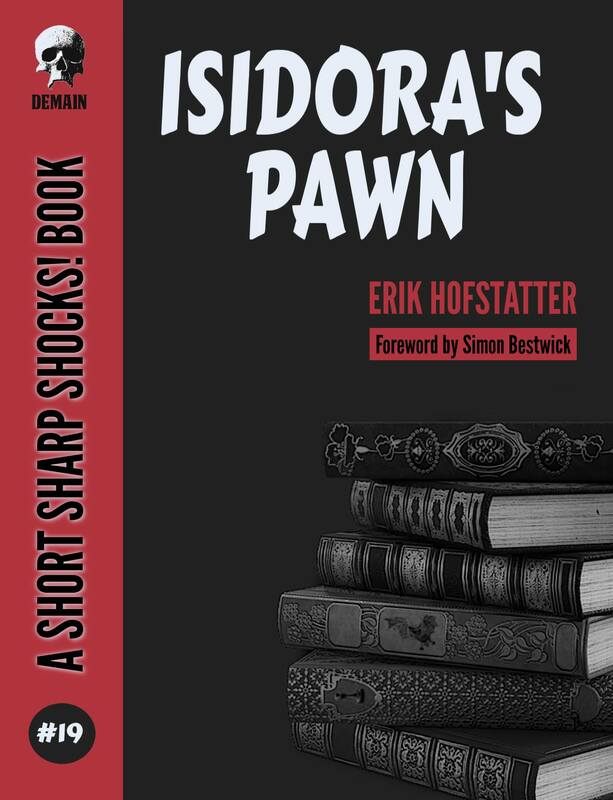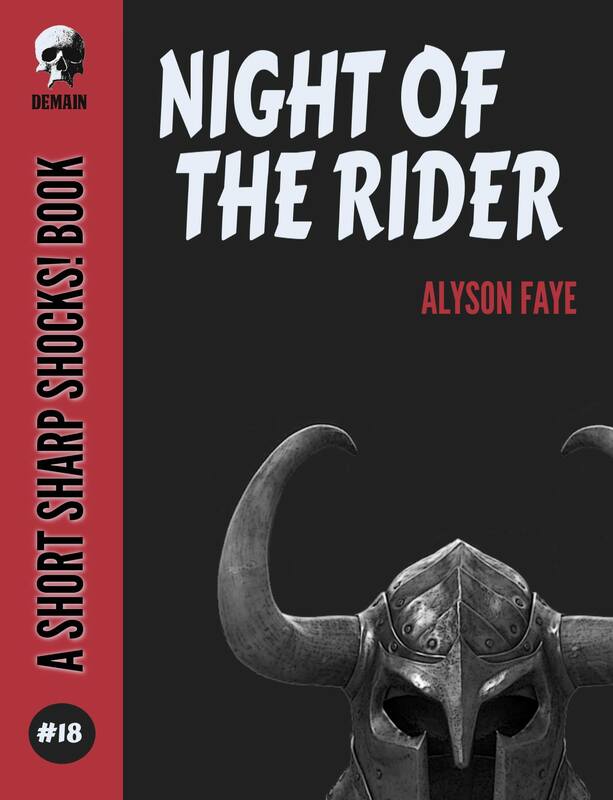|
|
|
Book 23 in the Short Sharp Shocks! is Magic by Eric Nash...
DEMAIN PUBLISHING: We loved Magic which fits nicely into the series so well done... ERIC NASH: I’m very pleased to be part of this superb collection. Thank you. DP: ...can you tell us a little about the book and how you came to write it? EN: Having children allowed me to glimpse the magic of childhood. We tell our kids stories of wonder inhabited by tooth fairies and elves, princesses and trolls, bunnies that deliver eggs, a grandfather that gives presents to all the world’s children in one single night, and for a short time they believe. This ability, this innocence, has long fascinated me, and Magic was a way of recording this. Of course, as I explored the subject, I entered the folklore forest and discovered the dark origins of some of western societies’ well-loved beliefs, and one of these made its way into Magic. DP: So what were your challenges when writing the story? EN: Threading magic into everyday adult life. The construction of [the character of] Grange’s grim reality, and the characters’ development needed to allow the story to hopefully bloom in the readers’ minds, may have meant nothing with the inclusion of an imaginary being. This is market town England, not Middle Earth, after all. I hope I’ve achieved a balance to anchor this story. DP: Well as far as we are concerned you have achieved that balance – so well done! In terms authors / books /mentors – who has influenced Eric Nash? EN: Ha, it would be nigh on impossible for me to choose a mentor or a favourite from the many great writers past and present, but a few have stood out. I always remember finding [Clive] Barker’s short fiction new and very powerful, Poppy Z. Brite’s work mesmerising, and the honesty and style of [Ray] Bradbury inspirational. Recently, I’ve admired the tension masterpiece, Birdbox, by the ever-changing [Josh] Malerman, as well as Emily Fridlund’s History of Wolves for its poetry. Oh, and I may be in love with Tim Winton’s prose in The Shepherd’s Hut. DP: There’s a great selection there my friend. Eclectic for sure. You working on anything right now? EN: My short story collection, Marrow, is taking shape now. Among its themes, the book explores the perception of masculinity, along with humankind’s relationship with the natural world, which is quite fitting given today’s state of climate breakdown. There are plans for Magic to be in the Table of Contents so expect a little myth and mayhem, too. DP: Sounds intriguing...looking forward to reading that...you ever suffer from writer’s block? EN: Ideas often come when writing; the very act seems to fire up one’s imagination. I like to be writing at least two stories, preferably three, at the same time, so I can work on one while the others are ‘resting’ between drafts. This method allows imagination to smoulder with minimal brainache and prevents this thing called writer’s block. That’s the theory anyway. Sometimes, I complete a final draft and there isn’t another waiting. Ha, and then I’m in the canyon of the lost. That’s when I pick up a pen (or fingerpunch the keyboard) and write gobbledegook, utter nonsense it doesn’t matter, because I’m repeatedly striking a match until there’s a spark. DP: So you don’t necessary outline... EN: A character, incident, or dialogue is often where I tend to begin; from there the story builds itself. The important thing is to go with it. After all, it’s the first draft, so I should allow it to be told, before I write the story. I believe it’s important to be fluid, don’t hold yourself to a formula cos chances are at some point you aren’t going to stick to it. DP: A good approach and actually something I’m working on right now – a short story – was borne out of just one line which I wrote down absentmindedly and which sounded interesting and I’ve managed to structure a whole story around it...do you have a favourite theme or genre you return to? EN: I haven’t a favourite theme per se, although I’ve spotted a few recurring nightmares. You could say that currently my writing is dark-themed and generally speculative. Genre is tricky, because if you write simply to fulfil genre expectations then the stories run the risk of being riddled with clichés. I think writers have a duty to their craft and the reader, not a given genre. What I learnt from writing Magic links with the earlier question on challenges. There was a point – probably third draft – where I was ready to shelve the manuscript, not convinced I could blend the worlds sufficiently. Instead, I let it ‘rest’, then worked at it until I thought what I had wished for was achieved. Writing, like most worthwhile things, is hard work. DP: It is that it is that for sure...bleedin’ hard work but worth it when it pays off. So finally, can you tell us something surprising about you... EN: I have an unhealthy attraction to deckchairs. And on that note – we’ll leave it there ha ha! Thanks for your time Eric Nash and the best of luck with Magic.
0 Comments
Today’s interview is with L.R. Bonehill who’s Whispers Of The Sea (and Other Stories) is a very powerful, intense and quietly horrific short collection...
DEMAIN PUBLISHING: Whispers Of The Sea (and Other Stories) is an outstanding piece of work – can you tell your readers a little about it and how you came to write it? L.R. BONEHILL: Firstly, thanks for the kind words and it’s great to be a part of what you’re doing with Demain [thank you – your words are appreciated]. These are all stories about grief and loss, frankly about the very worst kind of loss and I wanted to explore how we deal with that. How we move forward if we’ve lost everything, how we’d do anything to change things when the worst happens. They’re also thematically very close to each other, companion pieces almost, which is why I’m delighted they’re being published together. DP: Yes, it was a no-brainer that we published all three in one collection – and you’re right, though they aren’t connected stories they are definitely companion pieces – and all the better for that in my opinion. I suspect you faced a few challenges when writing them? LRB: These stories are all pretty dark, which horror should be of course, and the act of balancing that darkness with a little hope, a little light, can often be a challenge. I also wanted them to have a certain sense of ambiguity, especially the endings which I wanted to leave open to interpretation. Trying to hit the right beats and notes in that way is definitely a challenge. DP: I believe you certainly rose to that challenge. I totally agree that it was ‘better’ (perhaps profound is a better word?) to leave the endings ‘open’. I’m not sure whether any of the stories were based on personal experiences but did you ever feel you were actually one of the characters... LRB: To be honest, I’m not sure I’d like to be one my characters…a lot of bad stuff happens to them! The Beachcomber, the shortest of the stories, came to me more of less fully formed after witnessing an odd interaction between two people on a wet beach in Wales, so that definitely stems from a real life encounter. I wrote the story in about an hour and edited very little from that first draft…and trust me, that’s very rare. DP: I think the ‘rawness’ of some of the stories really fits the overall collection – I hadn’t read your work before but I’m certainly a fan now. There was something about the stories that made me keep going back to them long after we decided to publish...it’s almost dreamlike (well, I suppose nightmare would be a more apt)...I would say (in my opinion anyway) like an animated film...that would be fun...okay, my mind is racing far ahead of itself...which writers / books influenced you? LRB: In terms of influence, one of my biggest is Richard Christian Matheson. I’ve written a lot of flash fiction and Matheson was doing this long before we called it that. I love his short, sharp shock (apt, I know) approach. Any short story writer that hasn’t checked out his Scars and Other Distinguishing Marks collection really should change that. I read it at an age when I was starting to think about my own writing and it had a huge impact on me. He seems to effortlessly distil his stories down to the bare minimum and still leave you with a barb of a story that cuts deep, deeper than you realise at first. That’s what I try to do in my own work. Of course, whether I succeed or not is another matter. DP: So what next – anything you can share with us? LRB: I’m working on a couple of new stories at the moment, and revisiting a few unfinished things I’ve not looked at for a while. I’m also bouncing around ideas for a novella, which, funnily enough, involves a character from The Beachcomber, so that’s definitely next on my to-do list. Think this particular character has some mileage and there are more stories to tell about him; he’s seen a lot of life…and a lot of death too. Again, loss is definitely a theme I’m working with on this novella and the exploration of how we deal with grief, how we move on…or not. My characters often get stuck at the bargaining stage of grief and I feel, certainly in terms of horror and the darker side of fiction, there’s a lot of material to be mined in that uncertain cosmic space. DP: With so much going on, do you ever suffer from writer’s block? LRB: Not writers block as such, but I do tend to be afflicted with terrible procrastination. I often have a flurry of writing activity where I’ll put a few stories together in fairly quick succession…followed by periods where I’m not writing at all. Bad practice, I know, but having said that, I’m always playing with ideas in some way or another. DP: If it works for you then it’s fine – so would you outline a story before starting? LRB: Depends on the story to be honest, but most of the time I’ll just write and see where the story and the characters take me. I’ll generally have an idea of the beginning and (sometimes) the end… the rest is just working out how to get there. With the novella, I’m trying to be a bit more disciplined and maybe outline it more…but we’ll see. DP: Good for you! So do you only write in horror (not that that is a problem obviously!)? LRB: Horror is the genre I tend to work in. I’ve dabbled with other genres, but it’s always horror I come back to, horror that I’m most (un)comfortable with. It’s a much-maligned genre, but usually only with people that don’t understand or appreciate the scope it has to explore life and death in a way that other types of fiction may shy away from. DP: It’s a shame that horror isn’t treated with the respect it deserves. That is obvious by going to your local Waterstones where I’m sure you will find only a few horror books available which is a shame...okay, so pitch me Whispers Of The Sea as a movie... LRB: Hmm an elevator pitch fills me with existential dread, so I’m guessing it would go something like this: “How you doing? I’ve got this really great idea… sorry, was that your foot? Yeah, so this idea of mine…think you’ll really like…oh ok…nice chatting to you.” DP: Ha ha, you had that happen to you too, mine was with Jeff Goldblum!!!!!! Thanks for your time – L.R. Bonehill’s Whispers Of The Sea (and Other Stories) will be published on May 10th but is now available for pre-sales. And if you would like to connect with him direct: http://bonehillsboneyard.blogspot.com/ Less than a month to go now until the publication of Terry Grimwood's novella 'Joe'. It's available now for pre-sales. Be sure to check it out. Here's the Amazon write up.
'Joe walks with God. Now Joe is in love, but it is a love that dare not speak its name and it will tear his soul apart... Writing about ‘Joe’, author Terry Grimwood said: “Joe is inspired by the true story of a young gay man who attended the same (British) Baptist church as my first wife and I in the 1980s. His name was Simon, and he was charming, intelligent, kind and devout. I can’t say that we were close friends, but we were certainly acquaintances and he was someone I respected for the very obvious depth of his faith. I too was a convinced believer in the Christian faith in those days and regularly attended the church’s weeknight prayer meetings. Simon would inevitably stand and pray and was always eloquent and respectful. He was also in pain. His cries to God for help were soul-felt and often heart-breaking. Like most of us in the church, I had no idea that he was gay and that trying to reconcile his faith and sexuality was the cause of his agony, until it was too late.”' With a foreword by John Gilbert And a cover by Adrian Baldwin UK: https://www.amazon.co.uk/Joe-Terry-Grimwood-ebook/dp/B07QH7WBGV/ US: https://www.amazon.com/Joe-Terry-Grimwood-ebook/dp/B07QH7WBGV/ Nice one Alyson - who is (at the time of writing) number one in the 'hot new horror releases' on Amazon. Well done!!!!
Next up is the Short Sharp Shocks! (and actually right now, our favourite title surely?) Matthew R. Davis’ Supermassive Black Mass. A few days before publication (May 10th) Dean and Matthew sat down and chatted:
DEMAIN PUBLISING: Welcome welcome Matthew – let’s hit the ground running. Tell us a about your book and how you came to write it. MATTHEW R. DAVIS: Supermassive Black Mass was originally written for a SF horror anthology put together by my friend Steve Dillon. Alas, I didn’t get the edits done in time to make the final cut, but I’ve since reshaped the manuscript into its current, better form. The core idea was something that had been kicking around in my head for a few years: what if a crew of astronauts returned after many years away to find the entire planet overgrown by a single haunted house? I couldn’t see my way in, so I reduced the SF element and decided on more contemporary characters. I didn’t know who they would be until I happened across a copy of Electric Wizard’s Witchcult Today album, after which it seemed perfectly natural to make my lead a stoner metal frontman with a taste for ‘70s horror! I’ve extensive experience with all of those things, so writing [the character of] Terrance Cranston was no stretch at all – except that he’s had a fair amount of success, whilst I continue to toil in well-deserved obscurity. DP: I’ll be honest I had never heard of Electric Wizard before, but obviously I went on YouTube and checked them out...intriguing and they certainly grew on me...what challenges did you face when you wrote Supermassive Black Mass (it never gets boring typing that)? MRD: Handling the SF elements was tricky – I ended up taking more of a Weird Tales pulp angle on that, because hard science fiction is, well… hard! Otherwise, I had issues in my personal life that were keeping me from sitting down and concentrating on the work, and the usual threat of a looming deadline that I’d be hard-pressed to meet. I ended up writing the first draft in a single day. DP: One day?! Good for you (takes a breath...one day?!)...um, okay (still a little shocked)...did you ever feel that you were one of the characters at all? MRD: I can relate to Terrance – we have a similar taste in music, film, indulgences, and women – but no, I never felt like I was him, nor does anything he experiences come directly from my own life. (Deadbeat Kingpin, though, was once on the shortlist of names for my own band, for which I ultimately chose Blood Red Renaissance.) I did notice afterward, however, that there was a certain resonance to the overall storyline – man fights his way through an endless maze in a desperate attempt to reach his beloved partner – that was sympatico with events in my life at the time. DP: I love Blood Red Renaissance – great title for a book or film...for those that aren’t familiar with your work so far, would you say you have a specific writing style? MRD: That’s not for me to judge, really. I don’t try for any style in particular – that would be contrived, and I believe fiction should be as honest as a pack of lies can be. It is what it is, and some stories call for a different slant on it, but I’ve found my voice and that’s how I communicate my ideas. The hard part is nailing certain moods and feels – I’m often convinced that I haven’t quite evoked the atmosphere I want, whether that’s true or not. DP: Can you tell us about your influences? MRD: Early influences include: morbid tomes about Greek mythology and legendary monsters; Ray Bradbury; Roald Dahl; the occasional adult horror anthology, which chilled my blood as a child; and the Doctor Who Target novelisations – those of Terrance Dicks in particular, if only for his ubiquity. Following a fantasy phase where I was influenced by D&D, Raymond E. Feist, and Terry Brooks, I rediscovered horror, and my subsequent teenage writing was heavily redolent of Stephen King and Dean Koontz. After reading every horror author I could find in my local library, and coming across more sensuous authors such as Anne Rice and Tanith Lee, I entered a pot-induced surreal and violent period where my love for Ramsey Campbell and Richard Laymon became apparent. In recent years my style seems to have come into its own, but I can sometimes detect faint strains of Clive Barker, Laird Barron, and Caitlín R. Kiernan. As far as favourites and mentors are concerned, I suppose that the two biggest and most obvious influences / beloved father figures would be Stephen King and Ramsey Campbell. King is a born storyteller who is as important to the horror genre as Metallica is to heavy metal – he worked hard to earn his rightful place as exemplar and popularised the style, forever casting a long shadow over the field – and Campbell’s mastery of mood and simile is a height to which I continue to aspire. DP: Ramsey is a great guy and very helpful in / to our community – he more than deserves the plaudits he receives and such an easy person to talk too...so what next for you – what are you working on at the moment? MRD: I’m trying to find homes for two novel manuscripts and plotting out another, which I plan to write this year. I’ve a couple of musical projects on the backburner, simply from lack of time and resources, but progress is slowly being made on the next icecocoon album, Gardens of Dust. I’m always pumping out short stories, and the most exciting project on the horizon is my first collection, If Only Tonight We Could Sleep, which will be coming out later in the year. I’m currently working with my favourite human to create the photographs that will illustrate each story. It’s going to be something quite special. DP: That sounds amazing, I’d love to see that when it’s done. And also – can’t wait to hear the new album (I’m serious!) I was listening to Deepest Crystal Black only the other day and love it. I was lucky to meet a band from Sweden a couple of years ago called Yuma Sun who I’m sure you would like too as I can see some correlation between the two bands (and that is meant a compliment by the way) and I’d DEFINITELY come to a show where you were both playing. Honestly, all the luck in the world with the music and keep us updated. So – ever been affected by writer’s block? MRD: That’s a bit like asking a non-writer if they suffer from erectile dysfunction, but hey, we’re among friends here, right? Yes and no. I never run out of ideas – I have enough backed up to sustain me for decades, and there are always more – but I do sometimes find it hard to turn them into full-fledged stories. Other times, I just don’t feel like sitting down at the desk and doing the work. I’m generally not a writer who can chip away a little each day; I tend to work in intense fits and spurts. DP: I guess then you write outlines... MRD: I don’t usually outline short stories, though I do like to know where I’m going and how I’m going to get there. I have pantsed a few tales, but that doesn’t always work well for me. When it comes to novels, I need a detailed chapter-by-chapter layout of events and major plot beats before I begin, a skeleton on which to layer flesh and muscle and skin. Some writers find that too restrictive, but I see it as having a structure around which I can build my themes and narratives, with enough room to improvise and add new riffs as I go. DP: Whatever works, use it – is my motto. Is horror your favourite genre to write in? And when was all said and done, did you learn anything whilst writing Supermassive Black Mass? MRD: Everything I do comes back to horror in the end, but within that, there does seem to be a few recurring themes: the deep ache of loss, the joys and terrors of love, the life-changing power of music; men who exploit and / or fail women whether they mean to or not, and the infinite, unknowable depths of a godless and indifferent universe. I read widely and voraciously, but nothing satisfies me the way that intelligent, imaginative horror does, and so when I reach for my own instruments, that’s what I jam on more often than not. What did I learn? That hard science fiction is probably beyond the bounds of my patience and ability! DP: So, I’m a film producer – pitch me Supermassive Black Mass. MRD: “I’ve got some coke. Have a toot and pass this script on to your PA.” Lol, as idiots are wont to say aloud. Okay, let’s be real and assume we’re talking about indie producers and not Hollywood stereotypes: “Imagine if golden-era Hammer had made a Satanic sci-fi heavy metal horror, scripted by a young Ramsey Campbell. Or picture a stoned occult version of Scooby-Doo, starring Black Sabbath.” DP: Um, I think I want to make those movies...finally, can you tell your readers something they might be surprised to learn about you? MRD: That I’m a sack of rats cunningly disguised as a human. (Let’s face it, that would surprise anyone, unless we were talking about politicians, boom-tish.) I’m not saying it’s true, but then, I’m not saying it’s not true, either. A boy has to maintain some sense of mystery, yes? Definitely my friend, definitely! Thank you for your time and I hope your readers enjoy Supermassive Black Mass. If you wish to connect with Matthew direct: matthewrdavisfiction.wordpress.com www.facebook.com/MxRxD (author photograph (C) Red Wallflower Photography) Book 20 in the Short Sharp Shocks! is Plain by David T. Griffith. Dean and David have in the past worked together on a number of projects (particularly for Western Legends) but it had been a little while. Prior to publication, they sat down and chatted.
DEMAIN PUBLISHING: Hello David, hope life isn’t treating you too badly right now. So – Plain, tell us a little about it if you will. DAVID T. GRIFFITH: Hi. Sure. Plain started out as a four-page story in which I challenged myself to make a ridiculously mundane character fascinating. I wanted something more than a slice of life short story, so I added the voices Essy hears to create an unhealthy catalyst to her story. A traumatic event in her past that she orchestrated helped establish her psychological and confidence issues and serve as the driving force at the core of the story. It all grew from there. DP: It’s certainly a worthy inclusion to the SSS! series. I personally thought you handled those scenes with Essy’s ‘voices’ (so to speak) very skilfully. Were they the only challenges you faced when writing it? DTG: I’ve been working on Plain on and off for quite a long time. I would dive in and write a few hundred or thousand words and then let the story sit dormant for several months following each draft. I was never certain about my intentions for the story. Was it going to be a ghost story or psychological thriller? Would it remain a short story or grow into a novella? That led to my biggest challenge in ending the story. I explored different directions before finding the conclusion that felt right, which meant omitting an entire section that is set after the ending I finally established. I wanted to leave the door open to write about Essy again without ending the story abruptly. I feel like I accomplished that. DP: I’m glad you mentioned that actually because it would have been so easy to have ended the story differently – I won’t give anything away don’t worry – but I’m glad that the door has been left ajar...I was wondering whether any of the characters were based on you? DTG: I’d like to think I am the man wearing the blazer over his pajamas while walking his little dog each early morning, whom Essy would see on her walk to work, wondering why this woman was so peculiar. There are a few references to my personal life – the hardware store descriptions and the setting in Connecticut. DP: Ah, the Alfred Hitchcock cameo hey? I’m writing something right now and I keep putting ‘Dean’ into the story then deleting him...I love dropping in little hints that a character might be me...vain I suppose...we’ve worked together before but for those that haven’t read your work yet, would you say you have a specific style? DTG: I like to think I’m developing my own writing style a bit further with each new story. In my early writing days my biggest challenge was always ‘killing my darlings’, that is, deleting sentences, paragraphs, or entire scenes I loved in order to tell the right story. I’ve become far more brutal with my self-editing. Perhaps Essy’s violent streak is a manifestation of such. DP: That’s a good point actually...I wonder...as I’ve said in previous interviews I’m starting to bend towards the Hemingway approach of short sharp sentences...it’s not always achieved, but I’m getting there. With that in mind, which authors (or books) have influenced you? DTG: I have several favourite authors whom I enjoy for all sorts of reasons, but I think the following three authors each hold a strong influence over my current writing style and in what I strive to achieve. I am heavily drawn to Cormac McCarthy’s thorough and inventive writing style. Every single word, every bit of punctuation – or lack thereof – is absolutely deliberate. Not a single detail feels out of place. The work is dark and compelling, the imagery vivid, and the scenes flood every sense without overwhelming the reader. I love how his characters’ actions and behaviors are intertwined with the scene descriptions. On a different part of the dark fiction spectrum, I love the simplicity in Stephen King’s word usage and prose. I’m inspired by his ability to tell a story with such ease while painting horrific scenes and capturing subtle nuances of complex human behaviors. Lastly, I enjoy George Saunders’ ability to incorporate humor and absurdity in his otherwise dark and serious subject matter. He balances these qualities perfectly creating robust characters and stories. DP: Ah, Cormac McCarthy! I need to read him, I’ve got a couple of his on by TBR pile – I’ve heard so many great things about his work – haven’t had much time for reading (fiction) right now as my head is buried in a couple of historical projects and a proposed tv series which is an American political...what next for you? Anything you can share with us? DTG: I go with the flow and I’m always looking for the next submission opportunity. I’m working on a few new stories now and considering writing a full novel following an esoteric concept I’ve been playing with on my daily job commute. DP: A that’s really cool...I’d love to know more about your ‘esoteric concept’ in due course. Writer’s block – you ever suffer from it? DTG: I’m pretty certain writer’s block is a false condition. It’s more a fear of committing to an idea and developing it. I work through this fear of story commitment on a regular basis. I hate it, but it’s a worthwhile challenge. DP: Intriguing...I think that sometimes you can come up with an amazing idea but suddenly that idea becomes so huge that it becomes nigh on impossible to put pen to paper / finger to keypad because you are now frightened that you won’t be able to do that idea justice. The problem then comes that the idea won’t go away – it just gets bigger and better and the terror of not being able to ‘let it out’ is too much...bleedin’ hell...I’m coming out in a cold sweat...to help you do you write an outline before you start or just go for it? DTG: I just go for it and let stories develop organically. I almost never know where one will go or how it’s going to end. The characters’ development and consequences of their actions guide me. DP: Yeap. I’m writing something write now which is very specific, it’s about 23 individual characters with a very specific word count for each character – anyway, I had a general idea / theme for the story but it wasn’t until I’d written nine or ten characters that one of them said something and suddenly I knew exactly what the story was about and where it was going. Do you have a favourite theme (or genre) that you return to time and time again? DTG: I’ve always been a fan of noir and gritty realism. Looking back I have learned these genres inform the core of my stories. I love to dig into characters’ psychological issues and dysfunctional relationships, and explore how these characters are affected by the outside world while confronting much larger, horrific situations. There is also the body horror theme that appears regularly in my stories in varying degrees. I draw from my experiences with a few major surgeries and the subsequent recoveries. DP: I love body horror and want to explore that myself in due course – cheers for the reminder. Okay, so I’m a film producer – pitch me Plain. DTG: An alcoholic, repressed lesbian just released from the psych hospital is both haunted and driven to kill by the ghosts of those she has hurt. DP: And if you were writing a synopsis for a newspaper... DTG: I would use the following blurb: Essy is released from a psychiatric hospital after orchestrating her mother’s death a few years earlier. She moves to the neighboring town, where she can continue therapy with her psychiatrist. In pursuit of an idealistic happiness and normalcy, she finds herself both haunted and driven by those she hurt. DP: And finally, tell us something which readers might find surprising about you? DTG: I hate eggs as food. Great to speak to you again David – all the best with Plain! If you would like to connect directly with David: http://dtgriffith.com Twitter Address: @dtgriffith Another cracking review for Calvin's Short Sharp Shocks! appeared on 'The Sci-Fi & Fantasy Reviewer' website where it was said: "Perfectly paced, deftly written and infused with an intense atmosphere of horror and unbearable tension, The Town That Feared Dusk is another outstanding piece of Horror writing from Calvin Demmer and another feather in the cap of Demain Publishing." Adrian was also singled out for his cover work. Well done all!!!!
https://scifiandfantasyreviewer.wordpress.com/2019/05/03/the-town-that-feared-dusk-calvin-demmer-mini-review/ Calvin's book can be purchased here: UK: https://www.amazon.co.uk/Town-Feared-Short-Sharp-Shocks-ebook/dp/B07QFKM3DJ/ US: https://www.amazon.com/Town-Feared-Short-Sharp-Shocks-ebook/dp/B07QFKM3DJ/ Next up in the Short Sharp Shocks! Is Erik Hofstatter with Book 19 – Isidora’s Pawn (foreword by Simon Bestwick). With a week to go to publication, Dean and Erik sat down and talked about the book and Erik’s writing process.
DEMAIN PUBLISHING: Here at Demain we really loved Isidora’s Pawn – without giving too much away can you tell us more about it? ERIK HOFSTATTER: Thanks very much. The book is a homage to ageless Gothic classics of tragic and unrequited love--The Phantom of the Opera & The Hunchback of Notre Dame. It’s an intrusive emotion. Love. The character of Isidora was inspired by the ‘Jersey Devil’, a legendary creature from New Jersey folklore. The mythos seduced me right away. I combined those flavours with a Spanish traditional holiday called ‘El Colacho’, which involves men dressed as the Devil and jumping over babies who lie on mattresses in the street. People who read my short novel Toroa will know how much I relish writing about infants. But Isidora’s Pawn explores a different angle entirely. Another ingredient was a report about a Peruvian gang that supposedly murdered people for their fat. The book is also a farewell to my animalistic trio of stories, which began with The Crabian Heart and Toroa. DP: A gang actually murdered people for their fat?! What is the world coming too...other than research into some very bizarre aspects of humanity ha ha what challenges did you face when writing the story? EH: A friend of mine asked me once if I ever detected a web between my stories. I said no. BUT, the more I thought about it, the more I realised that I tend to flirt with the same theme—a character study of damaged individuals. Doomed love. Fragile souls. The human experience. I just gravitate to it. I fear repetition. I don’t want to write another Crabian Heart. I don’t want to write another Toroa. I’m a dark fiction author, but also a foolish romantic so naivety and cursed relationships are recognisable idiosyncrasies in my writing. Isidora’s Pawn still shares an identical blood group with the other two, but tastes differently. I hope. DP: Ah, the writer’s fear of repeating themselves. It does make me smile when I’m working on something and hit a wall and then come up with a novel way of solving the problem only to then realise that I used it in a previous piece of work...I too was conscious that in some of my stories during my second phase of creating (after I stopped writing books etc to concentrate on plays / short films) that the main character seemed to be the same person or a variation of the same person...perhaps that’s only natural, I don’t know...but I’ve tried to work on that...that person wasn’t me by the way which perhaps is even odder...is any of Isidora’s Pawn based on your own life? EH: As Simon points out in his introduction, we all occasionally feel the urge to escape banality and break away from the shackles of modern society—to escape somewhere. Anywhere. I was born in the Czech Republic but uprooted from an early age by my parents. We lived in Austria, Ireland, and England. My father visited Canada, where he originally wanted to emigrate. I felt like a rolling stone most of my life. [The character of] Orrin and I share similar flaws. My love life was rather shambolic last year and I crossed paths with several charismatic women. All bled their essence into female characters inhabiting the story. I also experienced my fair share of heartaches from people I loved and trusted. Isidora’s Pawn reflects those disappointments. Mine and theirs. But as [the character] Eduardo explains, the cruelties of love are universal. There is no escape. DP: Ah, that is so true my friend, so true. For those that aren’t familiar with your work – do you have a specific writing style and is there anything you find particularly challenging when you write / in your writing? EH: Narrative is the arrow in my heel. I prefer to unravel the story through dialogue mostly. Sometimes I wonder if I should’ve tackled scriptwriting instead. I have an elementary formula. I provide the reader with a cloak of ambiguity. I want them to decode the story in their own way. No spoon-feeding. Take away from it what you will. That’s the beauty of art. It sings to us in different tongues. As for a specific style, I’m not sure. It probably changes from book to book. Like a chameleon. I’m unpredictable. I lie to myself a lot. DP: Ah, you and I are very similar then – there was a great review of a novella I wrote in 2016 / 2017 where it was said that there was so much more going on under the surface, between the lines as it were that you thought the story was about one thing but actually it was about something else altogether. I really liked that. I compare some of my stories to those old ‘magic eye’ pictures where you have to keep staring and staring until the actual image appears and suddenly all the ‘confusion’ becomes clarity. In the screenplays I write I can’t be that ‘obscure’ sadly...I currently don’t (though am open to offers ha ha) but do you have anybody you consider a mentor? EH: Karen Runge. Karen is my solo beta reader. She lent me her eyes back in 2015 when I wrote Katerina and has been a major consultant and pillar of encouragement ever since. She’s a true master of her craft. I refuse to release anything without her seal of approval. That’s the highest medal of respect I can give. DP: It’s important to have that encouragement isn’t it? I was acting as a kind of mentor to a younger writer for a while but I’m not sure I was entirely successful as they’ve now given up writing which hopefully wasn’t because of me...anyway, anyway, so what next for Erik Hofstatter, anything you can share with us? EH: Unfortunately, not. I spat out 1000 words into a new manuscript, so it remains shapeless. Even I don’t know what it wants to be yet. Another cacophony of sad hearts, most likely. DP: Would you say then that you suffer from writer’s block? EH: No. Not so much from writer’s block, I’m more frustrated with my writing speed. When I read that some writers lay down 4000 words in two hours—I want to hurl myself from a very tall building. That would take me months. My well of ideas rarely runs dry, but the journey from brain to paper is an arduous one. Still, I’m an indie writer. My rules. My time. No deadlines. No obligations. No pressure. I write what I want, when I want. Writing doesn’t pay my bills; therefore I can take as long as I need. DP: Good for you. It’ll come when it’s ready, no point in forcing it I’ve learnt. Some days I can bang out 5,000 words or 20 / 30 pages of screenplay but then others it’s a struggle to get only a couple of paragraphs down...I’m guessing that you’re not one for outlining too much? EH: Sometimes I outline a basic plot and sail in a direction I want to explore. Other times, the compass is magnetised and I get lost at sea. The story drifts into uncharted waters. Somewhere beyond the light of day. DP: Very poetic. When you typed ‘the end’ (so to speak) on Isidora’s Pawn and read it over for the final time, did you feel you learnt anything from writing it? EH: It made me think about Samsara. A repeated cycle of birth, mundane existence, and death. Sometimes I feel like I’ve lived this life before, you know? Like I’m trapped in the same scenario over and over. An everlasting punishment. I’m still searching for a way out. DP: Ah, we really need to talk about this in more detail at some stage (but haven’t got time for it now unfortunately) but I’m beginning to think along the same lines particularly when it comes to ‘matters of the heart’...actually now I’m thinking about it, I’m writing a story for an anthology inspired by Dante’s Divine Comedy and perhaps I need to work in this theory...yeah, leave that with me...okay, enough about me – finally Erik can you tell us all something which your readers might be surprised to find out about you? EH: I practised martial arts for most of my formative years. It was my first love and fed me with grains of stability. I hold a rank of 3rd Kyu in Kyokushinkai Karate and 2nd Kup in Taekwondo. But then life happened. I abandoned my training and pursued writing instead. Here I am. Here you are indeed! Thank you for your time Erik and all the best for Isidora’s Pawn. If you wish to connect with Erik direct: www.erikhofstatter.net Twitter: @ErikHofstatter Instagram: @ErikHofstatter Facebook: www.facebook.com/erikhofstatter Author Interview - Alyson Faye. Night Of The Rider - Book 18 in the Short Sharp Shocks! series...5/2/2019 Book 18 in the Short Sharp Shocks! Series is Alyson Faye’s Night Of The Rider. Prior to the book being published, Dean and Alyson sat down and chatted.
DEMAIN PUBLISHING: Welcome Alyson to the Demain family. Night Of The Rider – what’s it all about? ALYSON FAYE: Thank you. I began writing it on a residential in a Castle in Yorkshire in a huge Victorian library- so that helped my mood. I do enjoy writing Victorian Gothic stories, but this time I had the idea of combining it with a magical element, the cursed, once human Rider. I wanted to contrast the real world of Victorian London’s seedy underbelly, with life in the family’s country mansion where the myth of the Rider casts a long shadow. DP: Sounds like the castle / library provided great inspiration then. Being that your story is ‘historical’ (so to speak) what were the challenges you faced when writing it? AF: One challenge was, I realised, as I went along that I wanted to make the Rider sympathetic, not a true baddy, so I wrote in his tragic back story. I also wanted Barnabas to remain likeable but misguided. I wanted his sister, Leonie, to be a feisty, strong female with her own inner life and not just there to faint and look pretty. I think I succeeded. In fact Leonie’s role grew as the father’s role decreased. DP: I agree, you did succeed. I was intrigued by the Rider’s back story and wanted to know more. For some reason he reminded me of the Night King in Game Of Thrones...but of course, that could just be me...are any events in the story based on your own life? AF: There are two things in the story which I took from real life. Milner House, where Barnabas flees home, was once a real mansion in the woods over the road from where I live. It’s now in ruins. The rich and famous family of local mill owner Titus Salt (who founded Saltaire village, an English Heritage site) built it in the late nineteenth century. The young puppy who ventures to cuddle up to the Rider, and sleeps beside him is based on my own rescue dog, a Labrador cross, called Roxy. DP: Oh I love that idea...we’ll have to arrange guided tours to the mansion...that’s really cool...okay, so for those readers who are not yet familiar with your work (but soon will be I’m sure!) – does Alyson Faye have a particular writing style? AF: Depending on the genre of the story I am writing i.e. crime / horror / humour, from that develops the language I use, and the style. For this story I deliberately used formal even archaic words to help set the period and the feel. I structure the dialogue of the characters to stay in synch. The trick is being consistent and not slipping into modern slang. DP: Yes – it’s quite hard when you write period stuff isn’t it – you have to be so careful with the words / phrases etc. When Romain and I wrote our screenplay about Napoleon’s son we were very conscious of this – there were a few words we wanted to use but they hadn’t been invented yet! Quite challenging...which authors (or books) influences you... AF: For this story, definitely Susan Cooper’s The Dark is Rising series, and Penelope Lively’s time slip novels. In my head I had Pre-Raphaelite art in mind when I was thinking about Leonie and the Rider. I am lucky enough to have a trio of female writers, crime and horror, I consider friends and mentors:- Ali Harper, Deborah Sheldon and Stephanie Ellis. All three have helped me immeasurably on my writing journey. Currently I am hugely enjoying the novels of Jennifer McMahon who balances different time periods, creates in depth characters you care about, writing chilling supernatural mysteries you could step inside and inhabit. DP: Ah, some great names there and of course here at Demain we are aware of Stephanie and her work! Can you tell us about the future...what are you working on at the moment? AF: Current projects – some are hot and current and some are on the back burner. I have a new Gothic short story, When Dead Eyes Sleep finished and a crime novella set in post-war Britain on the go and a time slip Y.A. novel with supernatural overtones set in the town where I live. DP: Crime thriller – great – you might be interested in Demain’s new strand – Murder! Mystery! Mayhem! Coming very soon...working in the different genres as you do, do you ever suffer from writer’s block? AF: Yes, there have been times when I write very little or stop, but the desire always comes back and I start up again. I have taught creative writing workshops so I have techniques and prompts to start myself writing again too. DP: So you write an outline before (and perhaps during) you start? AF: Some stories grow in my head, and come out on the page, others I need to make notes. For the longer works, I keep a chapter guide so I remember where I began and where I am going. DP: That’s good advice...do you think you will continue writing horror / history stories? AF: I enjoy writing horror hugely, and I am drawn to the Victorian period repeatedly. I’ve read a lot about the period and enjoy the research side, probably this goes back to my roots: doing a History degree and teaching. In this story I found I could mix magic and reality in a way I’ve not done much before. DP: I’m a film producer, pitch me Night Of The Rider please. AF: The Rider, cursed by darke magicke hunts for eternity. A debauched young man Barnabas, becomes his prey. When there is nowhere to run to, who will help you? DP: And finally, can you tell us something your readers might be surprised to find out about you? AF: I share the same birthday with my long time idol Cary Grant! DP: Well that’s really cool – we recently found out that I and Adrian (cover artists extraordinaire) also share the same birthday. Spooky. Thanks Alyson for your time and the best of luck with Night Of The Rider. If you want to connect with Alyson direct: https://alysonfayewordpress.wordpress.com/ Twitter: @AlysonFaye2 Amazon author’s page https://www.amazon.co.uk/l/B01NBYSLRT |
CategoriesArchives
July 2024
AuthorDean M. Drinkel |
